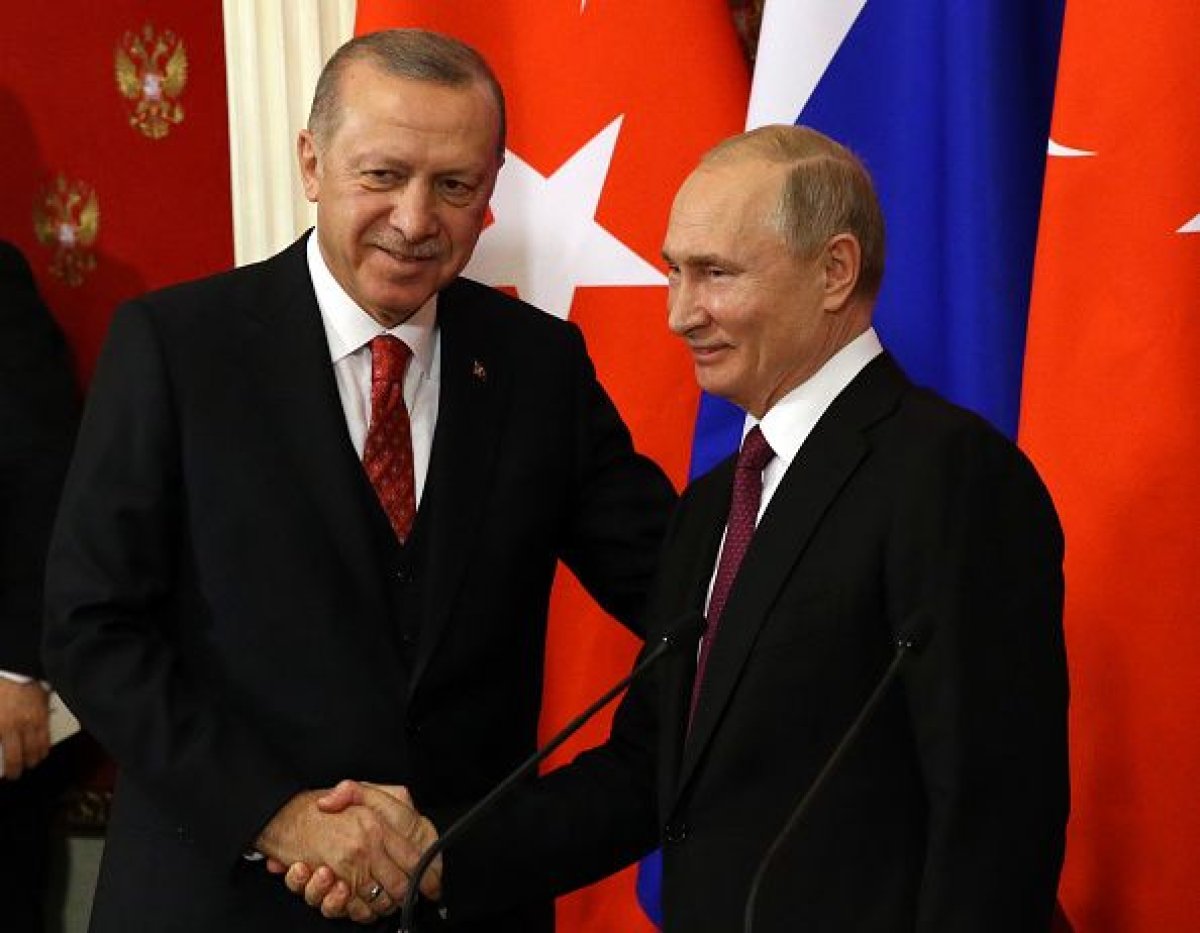Weeks after President Donald Trump announced that he would pull all U.S. troops out of Syria, the leaders of Russia and Turkey sat down to make their own plans for the country that would exclude the U.S.
"Cooperation between Russia and Turkey is a touchstone for Syrian peace and stability," Turkish President Recep Tayyip Erdogan said during a joint press conference after a three-hour meeting with Russian President Vladimir Putin on Wednesday. "With our Russian friends we intend to strengthen our coordination even more."
Putin and Erdogan both called each other "dear friend" during the press conference, and emphasized the solidarity between their nations.
It is unclear what their cooperation will look like, since Russia supports Syrian President Bashar al-Assad and Turkey would like to see Assad removed from power. Nevertheless, the two leaders hinted that they had discussed the coordination of ground troops and the fate of Idlib, where an al-Qaeda affiliate recently seized control.
Russia and Turkey both appear anxious for the U.S. to leave Syria so that they can lead efforts on the ground. Experts say that, despite their differing positions, both countries realize they must cooperate to maintain stability.
"There are many questions regional powers are now facing with the potential for a U.S. withdrawal from Syria, especially as this can open a power vacuum in the one-third of the country that the U.S. controls with its Kurdish allies, the 'useful Syria,'" Harrison Akins, a Middle East security expert at the Howard Baker Center, told Newsweek.

"A power vacuum inevitably will lead to competition for the many resources of the region and could devolve into violence. Despite Russia and Turkey often having conflicting interests in the region, both countries' leadership have the strategic foresight to understand that chaos and instability is detrimental to their nations' strategic interests," Akins added.
Meanwhile, the fate of the Kurds has become a point of contention between the U.S. and Turkey, who are ostensibly allies in the North Atlantic Treaty Organization (NATO). Trump had originally announced his intention to leave Syria after a phone call with Erdogan, during which the Turkish President pledged to take over the fight against the Islamic State.
The announcement that the U.S. would leave Syria sparked outrage in Washington, and Secretary of Defense James Mattis and Brett McGurk, the top U.S. official working with the coalition to counter ISIS, both resigned. McGurk later penned an op-ed for The Washington Post in which he outlined many reasons why leaving Syria would be a mistake. He also noted that Turkey is unable to operate in Syria without substantial U.S. support.
U.S. officials later announced that the U.S. would not leave Syria unless Turkey pledged not to attack the Kurds, who have been helping the U.S. fight the Islamic State. Turkey's leadership views Syria's Kurds as an extension of an armed group that has been fighting for independence from Turkey for decades. Erdogan was reportedly outraged by the reticence of U.S. officials to leave the country, and Turkish officials later suggested that they would strike the Kurds no matter what the U.S. decides to do.
The Kurds, meanwhile, in preparation for the U.S. withdrawl, have been drawing closer to Russia's ally Assad. On Wednesday, Putin said he supports further dialogue between the Assad and the Kurds, a move that would be in direct opposition to Turkey's aims in the country.
Turkey, Russia and Iran have been cooperating within the framework of the Astana peace process for Syria since 2017, but that process has yielded few results. Still, Trump's decision to pull U.S. troops out of the country has created a new imperative for cooperation.
"Whether the Trump administration actually follows through with Trump's statements, something that always remains in doubt given the confusion and contradictory positions emanating from the White House, political chaos and further violence in Syria would limit Russia's access to the country's resources and, from the Turkish perspective, give Kurdish forces the space to operate," Akins told Newsweek.
"With Erdogan and Putin meeting to discuss how to bring stability to the region, they are trying to create the conditions within which they can pursue their interests, perhaps through creating zones of interest and influence between the two powers, much as Sykes and Picot did for the post-Ottoman land grab in World War I," he added.
Uncommon Knowledge
Newsweek is committed to challenging conventional wisdom and finding connections in the search for common ground.
Newsweek is committed to challenging conventional wisdom and finding connections in the search for common ground.
About the writer
Cristina Maza is an award-winning journalist who has reported from countries such as Cambodia, Kyrgyzstan, India, Lithuania, Serbia, and Turkey. ... Read more
To read how Newsweek uses AI as a newsroom tool, Click here.








